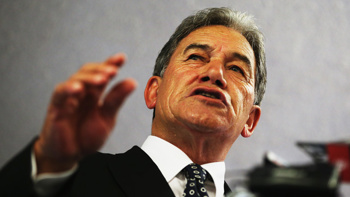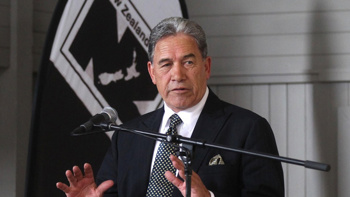Finance Minister Nicola Willis unveiled $7.5 billion in cuts and savings in her mini-Budget today, part of a drive to beat the books into shape as a gloomy economy weighs on the Government’s finances.
That figure does not include a programme of $1.5b of annual public service “savings” also announced, equating to $6b in cuts to baselines over the forecast period. The $1.5b in savings includes $500m of savings per year announced by Labour in August, but not yet implemented.
It corresponds to the $2.3b of “bureaucracy savings” included in National’s pre-election fiscal plan, and its cuts to consultant spending, costed at $1.6b in the fiscal plan. Willis said Treasury’s Half-Year Economic and Fiscal Update, released with the Budget “lays bare the extent of Labour’s economic and fiscal vandalism”, and promised that an “economic clean up” would begin today with the mini-Budget.
The forecasts are indeed gloomy: a weaker economy since the last update in September has seen the tax take fall by $1.6b over the forecast period, while expenses have grown, mainly thanks to more borrowing and higher interest costs.
STORY CONTINUES AFTER LIVEBLOG
STORY CONTINUES
The Government bond programme has been extended by $7b since the last update in September. The country is expected to enter a real GDP per capita recession, with GPD per head of population going backwards for two consecutive years. The cumulative effect of this on the books is to shrink the $2.1b surplus in 2027 that Treasury forecast in September to just $140m.
These forecasts were finalised as the new Government was sworn in and do not take into account any decisions it has made in its mini-Budget. Willis said the “culture of fiscal discipline has been degraded” under the last Government, and said there would be new rules drafted for Cabinet spending decisions, and the Public Finance Act, the overarching piece of legislation that regulates how the Government’s books are managed, would be amended.
/cloudfront-ap-southeast-2.images.arcpublishing.com/nzme/4RGIBNO5AJHPHNIKBOEIN7A474.jpg) Finance Minister Nicola Willis arriving with Treasury Secretary Dr Caralee McLiesh and officials for the HYEFU lock-up at Parliament. Photo / Mark Mitchell
Finance Minister Nicola Willis arriving with Treasury Secretary Dr Caralee McLiesh and officials for the HYEFU lock-up at Parliament. Photo / Mark Mitchell
Treasury costs new Government’s programme
Not all of the problems in the books can be laid at Labour’s door. Treasury’s costings of a couple of National’s campaign promises have hit a key campaign promise. National had wanted to save $2.3b over the forecast period by indexing benefits to CPI inflation rather than wages. As a result of changes to forecasts of CPI and wages, this policy will now save the Crown just $647m.
Ironically, this will mean beneficiaries do better than under the status quo in the next two years because CPI inflation will be rising higher than the measure of wages used to calculate benefits.
This comes at a cost of $36m over the next two years.
Treasury did not seem convinced the cuts would have a significant impact on the books, saying that once the new Government’s tax plan, to be announced in full at the Budget next May, was incorporated “the overall impact” of the new Government’s changes “would be broadly neutral over the forecast period”.Willis cited this as a vote of confidence from Treasury that the tax plan could be afforded, but it could also be read as undermining the Government’s claim to be running a starkly different fiscal policy to its predecessor.
Willis re-committed herself to the coalition’s tax plan, saying she could deliver it. The mini-Budget included the first such measure, returning the Bright Line Test (a form of Capital Gains Tax) to 2 years. Treasury also warned that changes like increasing the prison population could weigh on the Government’s books, although National set aside additional funding for this in its fiscal plan.
Willis was right that this was a “mini-mini-mini Budget”, it was in fact just six pages of press releases, a far cry from the 1800 pages of a full Government Budget.
There are few surprises in the document, the most significant part of which is a list of 16 mini-Budget decisions, which will have an impact on the Government’s books to the tune of $7.4bThis was a list of campaign commitments, which will have a cumulative effect of saving the Government money. Killing industry transformation plans, for example, will save $127m over hte next four years; killing the Lake Onslow project will save $64m; ending the RMA reforms will save $302m, and ending Let’s Get Wellington Moving will save $525m.
The biggest saving comes from ending commercial buildings depreciation, promised by both National and Labour, which is set to save $2.311b.
Fiscal Cliffs
Willis also unveiled her list of Fiscal Cliffs, something she had been teasing for weeks. This was a list of 21 things which have time-limited funding that expires in the forecast period.The new Government will need to fund these cliffs if it wishes them to continue. The cumulative total of the “cliffs” is $7.2b over the forecast period.
Most of the items on the list were forecast in advance, including the School Lunches Programme, an increase in the Pharmac budget, Covid-19 vaccinations, and film subsides. Willis drew attention to the Geohazards Science Services funding, a budget line with is crucial for the country’s resilience to earthquakes and other natural hazards.
National has committed to funding an increase to Pharmac’s budget, school lunches, and the apprenticeship boost scheme - Willis also revealed that a “cliff” in funding for Te Matatini, which runs out in two years, would also be funded.
Treasury’s list of risks to the fiscal forecasts - a list of things that could rock the Government’s books - makes uncomfortable reading. Treasury warns the increased prison population, growing demand for legal aid, and the cost of meeting New Zealand’s international climate commitments could weigh on the forecasts. The Government’s film subsidy regime may also need a top-up.
Willis drew attention to the former Government’s Transport Investment Programme, which had $85b committed, well short of the $288b needed to deliver it.
Economic gloominess
The economic forecasts made for gloomy reading. Economic growth is forecast to be slow, thanks to high-interest rates. GDP growth is expected to be just 1.5 per cent in 2024 and 2025, rising to just 2.8 per cent in 2026 and 3 per cent in 2027. The country is expected to enter a prolonged contraction in real GDP per capita growth, indicating a decline in living standards. In 2024 real GDP per capita growth will be -0.7 per cent. The decline continues in 2025, with a decline of 0.1 per cent.
Unemployment is set to rise to 4.5 per cent next year, and 5.2 per cent in 2025 well above the 3.6 per cent of 2023.
Inflation is the ray of sunshine, falling to 4.1 per cent next year and 2.5 per cent in 2025.
Earlier:
Willis has been careful to minimise expectations, emphasising how small it was.
The expectation management has seen the Budget lampooned, before its delivery as a “micro” or “nano-Budget”, in the words of Labour’s Finance spokesman Grant Robertson.
/cloudfront-ap-southeast-2.images.arcpublishing.com/nzme/YOLHDOU2KFEABJPMOAMCJ2OZGU.jpg) Labour’s Finance spokesman Grant Robertson. Photo / Michael Craig
Labour’s Finance spokesman Grant Robertson. Photo / Michael Craig
Ahead of the election, Willis said the mini-Budget would “[set out] some of the savings and reprioritisations we believe are necessary to get New Zealand back on track”, potentially including the 6.5 per cent back office savings National wants to use to fund $2.3 billion of its tax policy.
Almost as important as the Budget, is the set of forecasts released alongside it, known as the Half-Year Economic and Fiscal Update, or HYEFU.
In this document, Treasury publishes its view of the state of the economy and the state of the Government’s finances. Willis has promised she will also publish a list of “fiscal cliffs” and add to set out transparently some of the fiscal challenges the new Government faces.
Labour and its finance spokesman Robertson have pushed back strongly on Willis’ allegations of fiscal mismanagement.
Willis defines “fiscal cliffs” as time-limited initiatives that should arguably have been given permanent funding, citing the example of additional funding for Pharmac, apprenticeships, and school lunches. Labour argues these alleged cliffs were not hidden, as evinced by the fact they were proactively published in Budget documents, and the fact that both Labour and National promised funding for them in their election fiscal plans.
One potential “cliff” is $20 million set aside for the Te Pae Tawhiti transformation programme. This is a massive upgrade of the Ministry of Social Development’s computer systems and overall way of working. MSD has long called for the funding, noting some of its systems pre-date the internet and are arguably unfit for current needs.
IRD had a similar “transformation” project, which has been an immense success but came at a huge cost. The former government funded $20m to start the ball rolling on transformation but did not go further, largely through an unwillingness to commit a large amount of money upfront.
Thomas Coughlan is Deputy Political Editor and covers politics from Parliament. He has worked for the Herald since 2021 and has worked in the press gallery since 2018.
Take your Radio, Podcasts and Music with you









